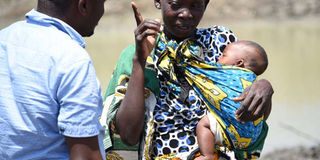We give birth till eggs run out; our men won’t have it any other way

Eunice Kitsao, 35, a mother of nine with her lastborn. Women in Kilifi do not use birth control because their partners don’t allow it. PHOTO| KEVIN ODIT
In Magarini, Kilifi County, Eunice Kitsao, 35, urges her two-month-old to take a sip of water that came from a water pan that residents of Boma Imani village share with livestock.
Of 25 water pans in Kilifi, only four have the precious commodity, but they are drying up fast, leaving residents and livestock to scramble for the natural resource.
Eunice’s breasts long dried up due to biting hunger, forcing her to wean her lastborn before the recommended age of six months. Instead of breastmilk, the tiny tot makes do with maize flour porridge.
“The baby was always hungry and I couldn’t afford cow milk, so I started giving her porridge,” Eunice said.
Health workers had told her to breastfeed exclusively.
“But where will the milk come from? I don’t have food,” Eunice said.
Along with hundreds of Magarini residents, Eunice stares at starvation. In the larger Coast region, more than 241,000 people are in dire need of food and water, according to data from the National Drought Management Authority. The hardest hit are women and children in Kilifi.
But, even in the face of starvation, Eunice, who has nine children, is not done bearing children yet. And she has no source of income.
“We give birth until there are no eggs left. God will provide,” she laughs, then adds, “I want to start using contraceptives, but I am afraid of my husband. Let me give birth for the sake of peace … until the eggs run out.”
Eunice’s neighbour, a 30-year-old woman who has 12 children, does not use birth control either. She tried taking the pill behind her husband’s back but it made her sick for weeks, and when he found out, he abandoned her for two years during which she faced rebuke and was castigated by her family.
She’d love to use a condom, but her husband, with whom she has since reconciled, would never allow it because some religious leaders say it means one is promiscuous.
Kilifi is one of the counties with a high poverty rate and a low literacy rate.
Dr Ademola Olajide, the United Nations Population Fund Country Representative, said that family planning faces challenges across Africa due to traditional and religious beliefs.
He said UNFPA is working with communities to help them shed these beliefs.
More than half of married women in Kenya are using a contraceptive. Eighteen per cent want to use family planning but can’t due to cultural and religious beliefs or their spouse is against it, said Dr Olajide.
This is referred to as unmet need.
“You cannot prescribe the number of children a woman should have. But it is important that one gives birth to the number she can take care of and it should not harm her health. Spacing is also important,” said Dr Olajide.
He said it is not in the best interest of a woman to have children too early, too close and too late. He added that one should not have too many children.
“It is important that we consolidate the gains and ensure that there is progress. It will translate into quality of life for the mother and child,” said Dr Olajide.



